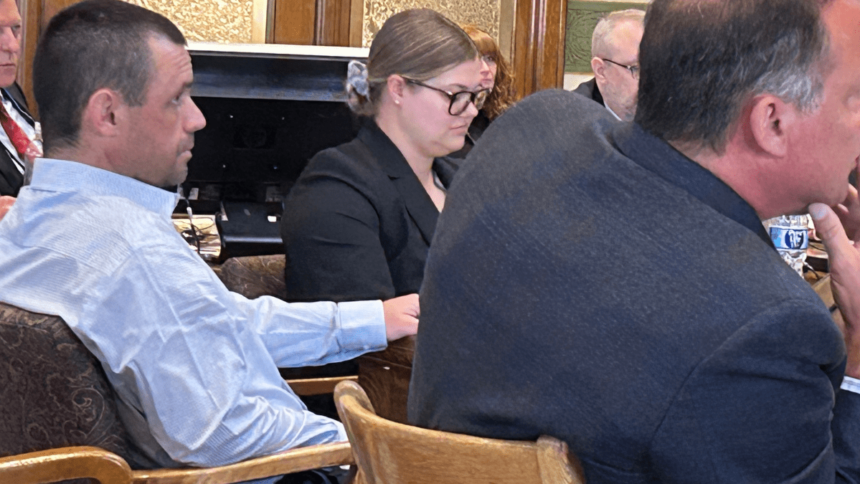MISSOULA — In the first and last test of a Montana law providing compensation to those wrongly convicted of a crime, a Missoula jury Tuesday rejected an attempt by Cody Marble to claim a $750,000 judgment — despite his exoneration seven years ago on a rape conviction.
The state district court jury, after five-plus hours of deliberation following a seven-day trial, said Marble did not prove his innocence in the 22-year-old rape case, and therefore isn’t entitled to the money.
Marble was convicted in late 2002 of raping a fellow inmate in the Missoula County Juvenile Detention Center earlier that year.
Yet Marble, now 39, has always asserted his innocence, saying the crime never occurred. After a years-long court battle, he was exonerated of the charge in 2017 after the Montana Supreme Court said prosecutors should re-examine evidence in the case.
At the time, Missoula County Attorney Kirsten Pabst said her review of the case convinced her Marble was falsely convicted and that he could not be convicted if retried. She filed to dismiss the charge in 2016 and a judge agreed a year later, allowing Marble to be freed from prison.
But when Marble filed a claim in 2021 under a new state law to be compensated for his wrongful conviction, Missoula County and the state aggressively fought his claim, arguing that the exoneration did not mean he was innocent.
The law — which is no longer on the books — required claimants to prove their innocence to receive compensation.
RELATED
The price of vindication
Cody Marble is seeking $758,000 in damages from Missoula County and the state of Montana for being wrongfully convicted of rape in 2002. As his case nears trial, the judge and county attorney who freed him 15 years after his conviction now say they were misled by the Montana Innocence Project. But the truth in this high-profile legal saga is as elusive as ever.

Vetoes complicate compensation claim for wrongful convictions
Cody Marble, who fought 14 years to overturn his 2002 conviction for a Missoula jailhouse rape he says never happened, is the only person who has filed for payment under a state law to compensate the wrongfully convicted. But his road to a potential $758,000 award has been made rockier by a pair of vetoes from Gov. Greg Gianforte — including one this May that caused the law to expire.
During closing arguments Tuesday, Andrew Huppert, an attorney representing Missoula County, said the case for Marble’s innocence was built on a “house of lies” by Marble and the Montana Innocence Project, which assisted with Marble’s attempt to overturn his conviction.
Huppert ridiculed Marble’s assertion that the alleged victim — Robert Thomas, age 13 in 2002 — and several other detention center inmates had conspired to concoct the story that Marble raped Thomas in March 2002.
Thomas and the other inmates testified against Marble at his 2002 trial, saying Marble raped Thomas in the shower of the prison cell “pod” where they were housed.
“I just never figured out the logic of that conspiracy,” Huppert said sarcastically.
Marble’s lead attorney, Mark Kovacich of Great Falls, asked the jury Tuesday who was more likely to lie: A group of troubled kids in juvenile lockup, or the lineup of adult professionals, including detention center guards on staff when the alleged incident occurred and Innocence Project officials, who said during trial they’re convinced the crime never occurred.
Kovacich also said the county and state never answered a central question: Why would Marble commit such a crime, in full view of other inmates, when guards could possibly see or hear it, two days before he was to be released from the detention center?
“Why would he commit a brutal rape in that tiny pod?” Kovacich said.
Marble took the witness stand last week during the trial, asserting his innocence and saying he never went into the shower with Thomas in 2002 and did not assault or rape him in any way.
He also blasted the county and its attorneys for now claiming he is guilty, after the county had said eight years ago that the conviction was flawed and the charge should be dismissed.
“They want to make sure that they get all the money, profit off my misery, and I get nothing,” Marble said, motioning at the county’s attorneys. “That law firm, right there.”
Missoula County told Montana Free Press it had paid the private law firm representing the county in the Marble case about $280,000 in fees and costs through the end of March. That amount does not include any trial costs and charges.
Thomas — the alleged victim in the 2002 rape — fatally shot himself 10 years ago after an hours-long standoff with police in Havre. He had been on parole from prison after a rape conviction, but hadn’t reported to his parole officer for months, and fled when police stopped him, leading to the standoff.
At the behest of the Innocence Project, Thomas wrote a statement in 2010 saying that Marble never raped him and that he had lied as part of a plot to harm Marble.
But after being told later by then-Missoula County Attorney Fred Van Valkenburg that he could be charged with perjury, Thomas recanted his admission and testified under oath at a 2012 hearing that Marble did rape him in 2002.
Marble is the only person to file a claim under Montana’s 2021 law designed to compensate the wrongfully convicted — and the last. The law expired last year after Gov. Greg Gianforte vetoed a bill that would have extended it past June 2023.
A Gianforte veto in 2021 also altered the nature of the proposed initial law, making the county where the person had been prosecuted responsible for 75% of the costs of any award. Before that change, the state had been responsible for the entire award.
The change brought Missoula County and its staunch opposition into Marble’s case.
LATEST STORIES
What Montana’s U.S. House candidates are saying about the southern border
Even though the U.S.-Mexico border is 1,000 miles south of Montana, congressional candidates have made it a central issue in this year’s election. Here’s what they said when we asked them what they’d like to change.
The GOP-heavy primary for Montana’s utility-regulating PSC
Lawmakers, former commissioners and engineers are heavily represented in the June 4 primary election for the Public Service Commission, which has been heavily red for two decades. Here’s how the candidates are differentiating themselves.
Medicaid unwinding deals a blow to a tenuous system of care for Native Americans
About a year into the process of redetermining Medicaid eligibility after the COVID-19 public health emergency, more than 20 million people nationwide have been kicked off the joint federal-state program for low-income families. Native Americans are proving particularly vulnerable to losing coverage and face greater obstacles to re-enrolling in Medicaid or finding other coverage.





